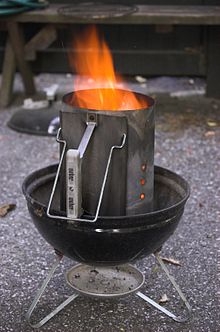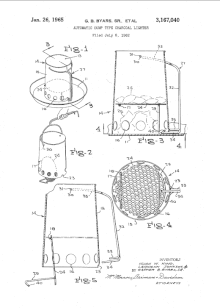Chimney starter

A chimney starter or charcoal chimney is a device for igniting charcoal lumps or briquettes. It consists of a metal tube with a grate to hold charcoal. A lighting cone is a similar, conical, device placed over an existing grate. The tube is typically cylindrical, but may also have other cross-sections.[1][2][3] The tube may also be made of combustible material designed to resist burning long enough for the coals to ignite.[3][4]
Modern commercial models are usually sheet steel cylinders about 6–8" (15–20 cm) in diameter and 8–12" (20–30 cm) tall. A grate or mesh to hold charcoal is placed horizontally inside the cylinder about 3" (8 cm) from the bottom; this is sometimes conical.[5] Large holes around the bottom let air in. Modern commercial chimneys generally have insulated handles.
History

A 1910 British design for a cylindrical metal portable stove is described as "also applicable for use as a Fire Lighter" and describes the use of paper kindling below a conical grate, with wood or coal above it.[6]
A 1917 design closely resembles a modern chimney starter: a metal cylinder with a raised grate and air holes below the grate. However, it is not described as a fire starter, but as a "camp stove".[7]
Home-made versions in the 1950s, called kindle cans, were often made from metal coffee, fruit juice, or motor oil cans with ventilation holes punched with a can opener, and did not have a grate.[8][9] They often did not have handles, and needed to be handled with tongs.

Various kinds of chimney starter have been patented over the years.[10][11]
Design considerations
Chimney starters essentially work by increasing the draft, supplying more oxygen to the coals. Taller starters are more effective than shorter ones. In empirical studies of lighting cones for Haitian charcoal stoves (which are placed over a grate rather than having an integrated grate), the ignition time and charcoal consumption were halved compared to lighting on a shallow bed grate, and carbon monoxide production was reduced by 40%. The cone also protected the charcoal from the wind, and helped direct the smoke away from users.[12]
Using a chimney starter
The chimney starter is used by placing kindling—typically paper—under the grate and charcoal over it. When the kindling is lit, it ignites the charcoal and creates a draft. Since the coals are held together, radiation heats adjacent coals, and convection heats coals higher in the stack. Once all the charcoal is burning (glowing red on the bottom and ashed over on the top), the chimney is lifted by its handle and the burning charcoal dumped into the grill. Dry newspaper is a popular and affordable chimney start but can cause increased smoke output during the process.
If some burning charcoal remains in the chimney, adding new charcoal will quickly ignite it.
Cooking
One can also cook directly over the chimney starter with an additional top grate. This provides high-intensity heat for fast searing.[13]

See also
- Charcoal lighter fluid, another fire starting aid
- Electric charcoal starter
References
- ^ "Outset Collapsible Camping Grill and Chimney Starter", [1]
- ^ U.S. Design Patent 471762S1, 2002
- ^ a b U.S. Patent US20160075961A1, filed 2014
- ^ "Fire kindler", U.S. Patent 1959473A, filed 1933
- ^ U.S. Patent No. 5,197,455A, "Charcoal starter", filed 1992
- ^ "A New or Improved Portable Stove also applicable for use as a Fire Lighter", U.K. Patent 191017067A, 1910
- ^ "Camp-stove", U.S. Patent 1298762A, filed 1917
- ^ "The kindle can", Sunset, 116 (1956), p. 90
- ^ "Tin-Can Combustion Chamber Ignites Charcoal Quickly", Popular Mechanics 113:6:185 (June 1960)
- ^ U.S. Patent No. US2920614A, Portable combined grill and charcoal starter, filed 1957
- ^ U.S. Patent No. 3,167,040, Automatic Dump Type Charcoal Lighter, filed 1962
- ^ Kathleen Lask, Ashok Gadgil, "Performance and emissions characteristics of a lighting cone for charcoal stoves", Energy for Sustainable Development, 36:64–67 (February 2017), doi:10.1016/j.esd.2016.03.001
- ^ Transcript of Good Eats episode
External links
 Media related to Chimney starters at Wikimedia Commons
Media related to Chimney starters at Wikimedia Commons
